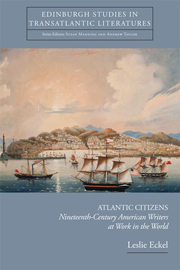Book contents
- Frontmatter
- Contents
- Acknowledgements
- Dedication
- Introduction: The Vocational Routes of American Literature
- 1 Longfellow and the Volume of the World
- 2 Fuller's Conversational Journalism: New York, London, Rome
- 3 ‘A type of his countrymen’: Douglass and Transatlantic Print Culture
- 4 Between Cosmos and Cosmopolis: Emerson's National Criticism
- 5 The Professional Pilgrim: Greenwood Sells the Transatlantic Experience
- 6 Standing Upon America: Whitman and the Profession of National Poetry
- Afterword: Vocation or Vacation? Transatlantic Professionalism Now
- Notes
- Bibliography
- Index
3 - ‘A type of his countrymen’: Douglass and Transatlantic Print Culture
Published online by Cambridge University Press: 05 September 2013
- Frontmatter
- Contents
- Acknowledgements
- Dedication
- Introduction: The Vocational Routes of American Literature
- 1 Longfellow and the Volume of the World
- 2 Fuller's Conversational Journalism: New York, London, Rome
- 3 ‘A type of his countrymen’: Douglass and Transatlantic Print Culture
- 4 Between Cosmos and Cosmopolis: Emerson's National Criticism
- 5 The Professional Pilgrim: Greenwood Sells the Transatlantic Experience
- 6 Standing Upon America: Whitman and the Profession of National Poetry
- Afterword: Vocation or Vacation? Transatlantic Professionalism Now
- Notes
- Bibliography
- Index
Summary
Nothing seemed to make her more angry than to see me with a newspaper. She seemed to think that here lay the danger.
Narrative of the Life of Frederick Douglass (1845)In Frederick Douglass's only fictional work, the 1853 novella The Heroic Slave, he retells the story of an actual slave revolt aboard the American ship Creole in 1841. Douglass imagines a tavern conversation in which the first mate recounts the ship's collapse under the rhetorical weight of the revolutionary argument made by Madison Washington, the novella's hero. In response to a friend's boasts that he could have quelled the rebellion single-handedly, the first mate comments:
It is quite easy to talk of flogging n—–s here on land, where you have the sympathy of the community, and the whole physical force of the government, State and national, at your command … but, sir, I deny that the Negro is, naturally, a coward, or that your theory of managing slaves will stand the test of salt water.
(Douglass, Life and Writings, 5:499)While slavery may perpetuate itself on land and under the jurisdiction of the American government, the first mate observes, its hierarchies dissolve immediately once they are exposed to the ‘salt water’ of the Atlantic: the test that any faulty policy is bound to fail. In this crucial moment, Douglass tests out his own theory of transatlantic politics, developed during his years in Britain and Ireland from 1845 to 1847, and he suggests that both thought and action outside national boundaries ultimately counteract the deficits of the culture that has developed within their limits.
- Type
- Chapter
- Information
- Atlantic CitizensNineteenth-Century American Writers at Work in the World, pp. 71 - 98Publisher: Edinburgh University PressPrint publication year: 2013



